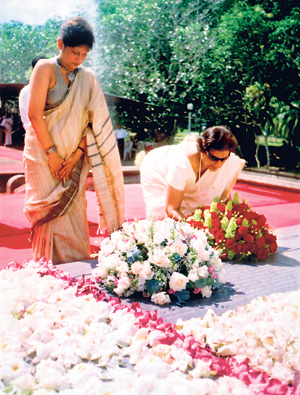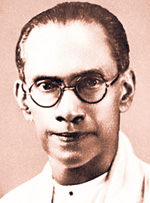After SWRD was appointed Prime Minister in 1956 the Oxford Society of Ceylon commissioned, and presented to the Standing Committee of the Oxford Union, a portrait of him by David Paynter, a leading Ceylonese artist of that time, who had painted the famous murals in the Chapels of Trinity College, Kandy and S. Thomas' College, Mt. Lavinia.

Former President Chandrika Kumaratunga and her sister Sunethra laying wreaths at the Bandaranaike Samadhi at Horagolla yesterday. Pic by S.U.W.P. Jayawardena. Inset: SWRD Bandaranaike |
As reported in the Ceylon Observer of 7th December, 1958, when the Standing Committee discussed the hanging of the portrait there were some objections on the grounds that Mr. Bandaranaike himself had violated tradition in being the only old Oxonian Premier who had never revisited Oxford even during his known visits to the United Kingdom; and that Mr. Bandaranaike's government had a racialist bias.
These arguments had been met, said the observer, by the simple and direct answer that amounted to this: the Standing Committee of the Oxford Union should not be responsible for breaking Oxford traditions just because someone else had violated them; they were honouring the tradition of hanging the portraits of former office-bearers of the Union who had become Prime Ministers and not endorsing or rejecting any particular policies of a Prime Minister. But, added the oObserver's correspondent, this did not satisfy an Oxford society known as JACARI - the Joint Action Council Against Racial Intolerance.
This Society which had its centre in Oxford and was connected with similar societies in other British Universities had resolved at one of their meetings that on the occasion of the unveiling of the portrait JACARI would move 'that this House do adjourn as a gesture of censure of the policy of racial intolerance adopted by Mr. Bandaranaike's government'. In the censure motion Ceylon was to be coupled and compared with South Africa on the element of racial bias.
The most remarkable feature of the JACARI resolution was that it was to be moved by a South African Rhodes Scholar; Ceylonese students on the JACARI Committee and outside tried, after the resolution was formulated, to persuade JACARI to drop the attempt to mar the occasion. For a long while JACARI was adamant and the Observer correspondent commented that had the unveiling ceremony taken place as scheduled on 10th November the censure would have been moved. But the postponement apparently gave the Union Committee members the opportunity to soften the impact of JACARI' anger.

SWRD Bandaranaike |
On the night of Thursday 4th December, 1958, in the presence of the Ceylon High Commissioner and his officials, members of the Ceylonese community in England and a large audience of under-graduates SWRD's portrait was unveiled by Dingle Foot, Q.C., at a ceremony in the Debating Chamber of the Union. Dingle Foot then a Labour MP, and later Solicitor General in Harold Wilson's Government was himself a former President of the Union (1928). He knew Ceylon well through his appearances in our Courts and in appeals before the Privy Council. Felix Dias, then a rising lawyer not yet turned politician, who was in London briefly to be admitted to the English Bar was in the Visitor's Gallery.
Who could have predicted that within one year he would suddenly be catapulted into national prominence and power on Mrs. Bandaranaike's dramatic entry into politics after the assassination of SWRD in September 1959. The unveiling ceremony took place before the commencement of that night's debate, the traditional weekly Thursday night debate at the Union.
The proceedings were broadcast live by the BBC. During question time, the ritual grilling that office-bearers are subjected to every Thursday, a procedure modelled on question time in the House of Commons, an undergraduate rose and put a question to the Treasurer who two days earlier had been elected President of the Union for the next term.
He was the second Ceylonese to hold that office. He had been elected over two other candidates; one is the present Leader of the House of Commons, the other is a senior MP. As reported by its London correspondent in the Times of Ceylon of 6th December, 1958, the question put to the President-elect was how, as a Ceylonese and in view of his known concern regarding the prevailing situation in Ceylon, he associated himself with the presentation of the portrait. The House fell silent; some mischief seemed to be afoot; there was a sense of impending drama; the background to the portrait affair was well known.
The same London correspondent said that the President-elect gave the following answer: 'I approved of the decision to hang the portrait because it was the unwritten rule of the Oxford Union that any former office- bearer who rose to the position of Prime Minister in his country was entitled to have his portrait hung in the Union. The hanging of the Prime Minister's portrait was an honour to him in recognition of his achievement in becoming the Prime Minister of his country. In that sense I would say: Let honour be done to a man who has earned it, though I wish to dissociate myself completely from the political policies that he stands for'.
According to a Lake House Foreign News Service report in the Ceylon Daily News of 6th December, 1958, the President-elect's remarks 'were received with tumultuous applause from a capacity crowd of nearly 1000 students who had assembled for the unveiling ceremony and debate to follow. His ordeal was over; the fractious Union audience was appeased; the occasion was saved; Dingle Foot made his speech, the portrait was unveiled and SWRD joined the immortals of the Oxford Union. Orson Welles, the famous film star (Citizen Kane, The Third Man, etc) was one of the guest speakers in the debate that was to follow the unveiling ceremony.
After the president's sumptuous dinner for the guests of the night, Orson Welles was enjoying a post-prandial snooze in the Debating Chamber from which he was rudely and prematurely awakened by the applause. When the President-elect returned to his seat on the podium, Orson Welles said to him: 'My dear man, what on earth, did you say? You woke me up. You shouldn't have done that'. The consequence of being caught in slumber was slightly more serious for the High Commissioner and his officials. They too had enjoyed the dinner. They had completely missed the fleeting drama of that night. The next day they were required by the Foreign Ministry, at the Prime Minister's request, to submit a report of what precisely had been said that night.
The hapless officials were unable to do so instantly. The BBC had refused to give them a copy of the tape-recorded proceedings. SWRD did not, and had good reason not to, trust the newspapers of the day.
They were at war with him, especially the Lake House group and most especially the late Tarzie Vittachi, the brilliant satirist
and Aubrey Collette, the brilliant cartoonist, who mercilessly lampooned SWRD, Sunday after Sunday, in the Ceylon Observer.
Indeed, even after his portrait had been unveiled at the Union, the Collette cartoon in the Sunday Observer of 7th December, 1958, caption 'Hanging on the Line' showed the framed portraits of three British Prime Ministers, an empty frame next to them and SWRD hanging on monkey-like to the bottom of the empty frame trying, but unable to climb into the frame.
This was no doubt amusing to SWRD's detractors, but it went too far; no reasonable person could have denied that SWRD had richly deserved the honour that the Oxford Union had conferred on him.
When SWRD finally read the report of the incident at the unveiling ceremony, it is said that he asked a member of his entourage, the popular Ceylonese question, who is this young man's father? On hearing the required information, SWRD broke into a loud guffaw (SWRD and the young man's father were old friends) and said, 'I will wait till he comes back and give him a good spanking'. In fact, they never met; the prime minister was assassinated before the young man came back.
The Prime Minister must surely have recalled the moods of a House of which he was the complete master in his time.
The Oxford Union has always been noted for its intolerance of pomposity. Many a Cabinet Minister speaking as a guest at the Union, after taking a barrage of broadsides fried from the floor floundered helplessly like a boat without power in a choppy sea before sinking into his seat. The Union has always been noted for its independence.
Winstofl Churchill never set foot there after the Union had resolved in 1936 not to fight for King and Coun try. The Prime Minister must have remembered his own irreverent attitude to the Establishment of his time. Had he lived he would have enjoyed the incident which occurred one year later when the bust of Prime Minister Harold Macmillan was unveiled. Before the debate started, however, an undergraduate moved an adjournment motion to protest at the Government's failure to bring the nationalist leader in Nyasaland Dr Hastings Banda to trial. The presence of Macmillan, Monckton and Alan Lennox-Boyd and a number of other Cabinet Ministers in the chamber that night created an opportunity for protest witch was too good to miss. Macmillan said to Lennox-Boyd, in a loud stage whisper that was intended for, and certainly reached, the ears of the President, an American, 'Alan, if this motion is passed, I am leaving. Are you coming?'
The President called for a show of hands and, despite the decisive majority in favour of the motion declare it defeated. There were cries of shame and demands for a count. It was a display of sophisticated intimidation by the British Prime Minister. The young President wilted. Of course, Macmillan would not have walked out and wrecked his own hour of glory.
Once again on an occasion when the Union was basking in its traditions by honouring a great figure from its past, it asserted its independence. The saga ends with the visit that SWRD never made and the speech he never delivered. Suddenly, in September 1959, the Union was informed that the Prime Minister would visit it and speak at the first debate of the October term. His biographer says it was an occasion SWRD would have relished. Indeed he would have. There would have been good publicity for Ceylon. His visit was eagerly awaited. He had never been to the Union since he left Oxford in 1925. Why this hurried visit? Were the reason astrological or political or both? His government was crumbling. The Irish Prime Minister was asked, and willingly agreed, to give up his own debate to accommodate the Prime Minister of Ceylon.
SWRD picked the subject - 'Democracy is unsuitable for ‘Underdeveloped Nations of the World'. He had not indicated on which side of the motion he wished to speak. He could have spoke on either, such was his skill and versatility. But can one seriously doubt where his heart and beliefs lay? Tragedy struck on 25th Septembe 1959. The Prime Minis died on the 26th.
The debate took place in October as planned. The. President-elect when the Prime Minister's portrait was unveiled, now an ex-President, made the speech in his place. House was somber. He opposed the motion. The motion was resoundingly defeated. That ex-President made the best speech of his life. The Prime Minister's portrait is the largest one on the walls of the Oxford Union. He never saw it hanging there. 'Let honour be done t one who has earned it'. |


